Canadian-Chinese in the C.B.I. 1944-45
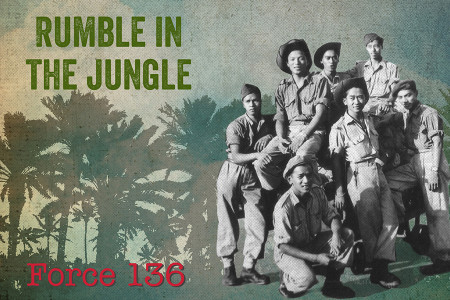
Force 136
Rumble in the Jungle: The Story of Force 136 is on at the Chinese Canadian Military Museum in Vancouver Canada until the end of 2016. More information at: www.ccmms.ca
Ironically, while these men were agents for the Allies, back home in Canada they were not considered citizens. Although born in Canada, these soldiers could not vote, nor could they become engineers, doctors or lawyers. Many were forced to live in segregated neighborhoods. In some cities, they were forbidden to swim in public pools and were forced to sit in the back of theaters.
In late 1941, Japan entered the war. It quickly invaded large swathes of Southeast Asia. Many of these areas had been British, French and Dutch colonies.
Britain was desperate to infiltrate the region. They had had some success in occupied Europe when Special Operations Executive (SOE.) trained and dropped secret agents into France, Belgium, and Holland. These agents organized and supported local resistance fighters, and helped with espionage and sabotage of infrastructure and German supply lines and equipment.
However, Southeast Asia presented unique challenges to SOE. It was a vast area with many islands, challenging physical terrain and diverse populations and languages. As well, most of the residents of the region resented their former colonizers.
SOE realized that Caucasian agents would stand out too much and would struggle to gain local trust. The British needed an alternative.
There was one glimmer of hope. Scattered throughout the region was a sizeable population of Chinese who were vehemently opposed to Japanese occupation and angry about Japanese aggression in China. The question was how to contact and organize them?
That’s when the British discovered Chinese Canadians. They could easily blend into the population. They could speak Cantonese. They were loyal to the Allies. And there were lots of these young men waiting for an assignment.
Between 1944 and 1945, Chinese Canadians were recruited and quietly seconded to SOE in Southeast Asia (Force 136). They were told they had a 50-50 chance of surviving. They also were sworn to secrecy.
To do this kind of work would require much more than basic army training. The men would need to learn commando warfare techniques. Over the course of several months they learned skills such as: stalking; silent killing; demolition; jungle travel and survival; wireless operations; espionage; and parachuting.
Originally unsure that Chinese Canadians could pass muster, SOE recruited in waves. The first team consisted of only 13 hand-picked men. Eventually, about 150 were seconded for Southeast Asia with the majority based out of India.
Some men had been assigned to do short trips into occupied Burma. But 14 Chinese Canadians found themselves operating behind Japanese lines for several months in Borneo, Malay, and Singapore. They endured primitive conditions as well as suffocating heat and humidity. They befriended headhunters and other guerrilla groups in the jungles. To survive, some men were forced to eat monkey and crocodile meat, and even insects.
Fortunately, all the Chinese Canadians in Force 136 survived the war although some came back sick with tropical diseases.
With the war over and the Allies victorious, Chinese Canadians now wanted a second victory – the right to vote. Armed with their war wounds and service records, veterans became part of a chorus that demanded full citizenship for the community. Their loyalty won out. Two years after the guns fell silent, Chinese Canadians were finally granted citizenship. By 1957, the country elected their first Chinese Canadian Member of Parliament: Douglas Jung, who had served with Force 136.
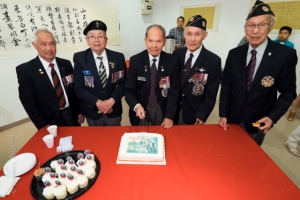
Veterans from Force 136; Hank Lowe, Gordon Quan, Tommy Wong, Charlie Lee & Ronald Lee, cut their cake, 14 May 2016
Today, through the Museum’s special exhibition, a new generation is learning how the blood, sweat, and tears of a small group of men, in a secret jungle war, helped change the destiny of an entire community. And how their service helped secure a coveted title: the right to be called a “Chinese Canadian.”
Condensed from information found with the Chinese-Canadian Military Museum, Vancouver, Canada.
Click on images to enlarge.
####################################################################################
CBI Roundup Humor – Private Louie by Somerville
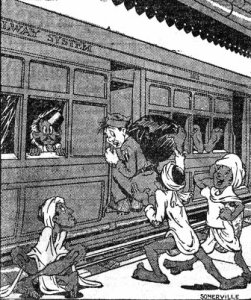
Louie leaving for a change & rest – the bearers have all his change and the railroad got the rest !
#####################################################################################
Farewell Salutes –
Edward Albert – Milwaukee, WI; US Army Air Corps, WWII, PTO, 11th Airborne Division
Kenneth Bailey – Ames, IA; US Army Air Corps, WWII, ETO, B-24 pilot, Major (Ret.)
Joseph Clancy – Durand, MI; US Army, WWII & Korea, Captain
Kenneth Eastlick – Osoyoos, BC, CAN; RC Army, WWII
Beryl Head – Hawke’s Bay, NZ; WR Air Force, WWII, LACW R-T operator
George Keyser – Redington Bch., FL; US Army, WWII/USAF, Korean War
Keith Meredith – Launceston, AUS; RA Army # TX6408, WWII, 6th & 2nd Regiments
Garrett ‘Ray’ Myers – Hemet, CA; US Navy, WWII, signalman
Allen Pellegrin – Houma, LA; US Army, WWII, 109th Engineers/”Red Bull” Division
Karl Zerfoss – Chicago, IL; US Army, WWII, 397th/100th Infantry Div., T-5 radio operator
#####################################################################################
Posted on December 1, 2016, in Current News, WWII and tagged 1940's, Canada, CBI, History, Military, Military History, Tributes, UK, veterans, war, WW2, WWII. Bookmark the permalink. 128 Comments.
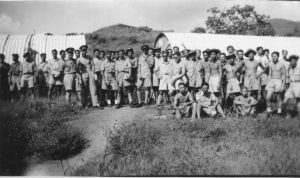
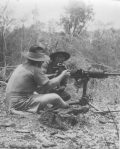
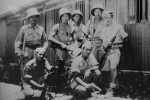

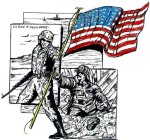







Thanks for this fascinating post. It’s important to highlight this kind of history out there for the world to recognize!
LikeLiked by 2 people
Thank you for taking the time to remember these troops. If more people learn and remember – maybe we can limit the hostilities around the world today.
LikeLiked by 2 people
You have a good point there.
LikeLiked by 1 person
Shades of what the Aboriginals went through. Extremely brave men doing very hazardous work. I’m glad they were able to vote so soon after fighting for their country. I cannot understand those who don’t bother to vote.
LikeLiked by 2 people
This situation was very much like the Aboriginal population. I have in mind to do a post on them, but I couldn’t say exactly when.
LikeLiked by 2 people
So interesting.
LikeLiked by 2 people
I couldn’t believe there were so many who knew nothing of this. We really should improve our school systems. Thank you for reading this article.
LikeLiked by 1 person
An excellent piece of Canadian Military history gp, these men formed a very elite team and must have endured much more than the average soldier serving behind enemy lines.
Not the first group to not have prior recognition before their service was completed, our Aboriginal Servicemen had the same irony, not permitted to vote before they left or when they came home, not permitted in White only pubs.
A sad indictment on our fellow countryman.
Cheers.
LikeLiked by 2 people
So true. I’ve mentioned your Aboriginal men in a number of posts – another brave group of men. I’ve tried to make that clear to the readers that most every country has had something to this nature in their past, and we should learn from that history – not try to erase or forget it.
LikeLiked by 2 people
Great story.I didn’t know Chines Canadian has no rights.Happy after war they get citizenship to
LikeLiked by 1 person
Thank you, Mary Lou. Hopefully we learn from this history.
LikeLiked by 1 person
Wonderful piece of history.
LikeLiked by 1 person
Thank you, Ann.
LikeLiked by 1 person
I am a Canadian and didn’t know about this! Thank you for another valuable post xx
LikeLiked by 1 person
I’m not surprised, Christy. It’s not exactly something your country would brag about, but each country has something of similar content in their past. I feel it’s better to know the history and learn from it rather than have it swept under the rug.
LikeLiked by 2 people
This is a very good write up… recognizing the contribution of the Chinese Canadians in war. I was just saddened to read that they were discriminated before.
LikeLiked by 1 person
Every country and/or nationality has experienced something of this nature at one time or another in history, so this is not unusual, but I wanted to get them the recognition they deserve. It’s good to see you, Ompong!
LikeLiked by 1 person
Nice to read again what you are sharing, gp… 🙂
LikeLiked by 1 person
I appreciate you saying so!!
LikeLiked by 1 person
G.P., I wonder if you or any of your readers knows of any personal memoir written by a Seabee. We have tried Amazon unsuccessfully and our library does not have one.
LikeLiked by 1 person
For immediate access to information, Mustang Koji suggested this site for data which is very good.
http://www.seabees93.net/GI%20Green%20Island%206th%20ED.htm
Amazon is big, but sometimes overrated – try here:
http://www.thriftbooks.com/browse/?b.search=seabees#b.oos
The Navy SeaBee Museum site may assist you:
https://seabeemuseum.wordpress.com/
AND – if you type the name John R. in my Search box at the top-right of each post you will find info from that fine gentleman!
LikeLiked by 1 person
Thanks.
LikeLiked by 1 person
No problem! I am thrilled to know of your interest and will always try to help out if I can – or find someone else who is more qualified.
LikeLike
I always learn something new here each time I visit, GP, including from the commenters.
LikeLiked by 1 person
So true! The readers teach me all the time. The way they contribute to this site is remarkable!!
LikeLike
Wow! I never read about this before.
LikeLiked by 1 person
Every country has something in there past they would rather not advertise I suppose. I ran with this story to get these men the recognition they deserve and I appreciate you reading it.
LikeLiked by 2 people
You really do a service in presenting information like this. Thank you.
LikeLiked by 1 person
Thank you very much, Anna. I appreciate you saying so!
LikeLiked by 1 person
Einen schönen Advent wünsche ich dir lieber Gruß von mir Gislinde
LikeLiked by 1 person
Ich danke Ihnen sehr, Gislinde. Ich wünsche dir das Gleiche.
Ich hoffe, dass Sie sich gut fühlen.
LikeLike
Reblogged this on Lest We Forget and commented:
Something I didn’t know about World War Two
LikeLiked by 1 person
I appreciate your help here in keeping these memories alive! You’re still the mentor.
LikeLike
Did I tell you about Remembrance Day in Montreal?
https://goo.gl/photos/hYafig6GA5ZDDBDu5
Two airmen I have done research were honored. Albert Dugal and Eugène Gagnon.
LikeLiked by 1 person
No you hadn’t, but thank you for sending the link! The pictures are fantastic showing such honor and respect for these men!!
LikeLike
Thank you for a post that opened my eyes and expanded personal knowledge – this Canadian had no idea.
LikeLiked by 1 person
Most every country has something like this lurking in their past. It is up to us to help people to learn from history instead of sweeping it under the rug. I appreciate you coming by.
LikeLiked by 2 people
Slightly off topic but this afternoon I listened to a documentary on CBC radio about Japanese “comfort women” abducted or lured into sexual slavery during the war – lest we forget has far reaching tendrils.Completely unrelated thought – what’s your opinion of U.S. veterans at Standing Rock?
LikeLiked by 1 person
Veterans believe – ‘I may not like what you say, but will defend to the death your right to say it.’ Each man in this situation has their own opinion and those at Standing Rock are doing what they believe is the correct action. IMO – only history will decide if they were right or wrong.
LikeLiked by 1 person
Well said. I hope history gets the facts straight.
LikeLiked by 1 person
Depends on who writes it.
LikeLiked by 1 person
Precisely.
LikeLiked by 1 person
Great story on many levels, GP. I’m glad none got killed and they were granted rights too.
LikeLiked by 1 person
Yes it is, Jet! Their bravery and character won them the respect.
LikeLiked by 2 people
Yes! 🙌 I love that they won citizenship. I was on the edge of my seat reading this, hoping they would get what they rightfully deserve. Thank you for sharing this.
LikeLiked by 1 person
My pleasure! I’m very glad you found it interesting!
LikeLiked by 1 person
I’m glad they got the rights they deserved.
LikeLiked by 1 person
They sure earned it. Thanks for dropping in, Dan.
LikeLiked by 1 person
Amazing piece of history which — once again — I had no idea existed. Thanks.
LikeLiked by 1 person
Well, so much went on, it really is difficult (IMO) for anyone person to have heard it all!! Thanks for reading it, Jacqui!
LikeLike
Hey buddy, do you have an email address or somewhere I could speak to you privately? Have you seen Hacksaw Ridge? Awesome film! anne.t.bell@gmail.com
LikeLiked by 1 person
These comments are private until I approve them. Only you and I can see them until I do that. So anything private you wish to say – just send here and tell me to delete it after I read it. I leave the email open for the others that use this computer.
No, I have not seen the film yet, but read that Mel Gibson received a standing ovation at the premiere and many posts from bloggers ALL recommend it.
LikeLiked by 1 person
Done, messages on the blog
LikeLike
You have my congratulations, Anne!! I knew if anyone could get it done, it would be you!
All will be kept confidential.
LikeLiked by 1 person
Many thanks~
LikeLiked by 1 person
Something else I knew nothing about, GP. Thanks
LikeLiked by 1 person
I’m always looking around, Derrick. It’s good to know that I’ve dug up something new for people to learn. Like my dad Smitty used to say, “The day I stop learning, please close the lid.”
LikeLiked by 2 people
As we know, Smitty was a wit 🙂
LikeLiked by 1 person
Yup, a dry sense of humor I have to admit [mine too for that matter], but he was always quick with a response!!
LikeLiked by 1 person
Reblogged this on Ancien Hippie.
LikeLiked by 1 person
Thank you, Penny for sharing the stories of the people who deserve recognition.
LikeLiked by 1 person
A really interesting post, thank you. It is truly astonishing nowadays to read about people’s attitudes in the 1940s…and these were the good guys!
LikeLiked by 1 person
Good guys who had been taught differently than you and I, in a world we’ll never see again.
LikeLike
Yes, they were good guys who were taught differently than we were in a world we’ll never live through.
LikeLike
I’ve never heard of these guys, so thanks. It’s a shame it took such lengths before they were even recognised as citizens.
LikeLiked by 1 person
Yes, it is a shame, but they were not the exception, but the rule way back then. It was a different world – in some ways better and in others way they were not.
LikeLiked by 1 person
I think perhaps it would have been more proper and appropriate to refer to them as Canadians, not ‘Chinese-Canadians’, like Afro – Americans, instead of Americans, it has a second class citizen feel to it I believe.
They have earned the right to be recognized as fully fledged Canandians and Americans
LikeLiked by 1 person
This is how their own site calls them, so I did not question the term. In my opinion, yes they are Canadian, but nowadays everyone wants a label – what can I say?
LikeLiked by 1 person
You’re lucky GP with your ‘First Amendment’you can say what you like 😀
So you go ahead and tell them, that they are Americans and Canadians and if anybody objects it’s “just tough titty” as we in Australia are wont to say. 😈
LikeLiked by 1 person
We are lucky to have the 1st, but sometimes people push it to the limit.
LikeLiked by 1 person
You’ve done it again, brought a group of unsung heroes to our attention. Super post. Thanks.
LikeLiked by 1 person
Thank you very much, Hilary; coming from a person with your expertise, I take it as quite the compliment!
LikeLiked by 1 person
As always, you have surfaced something I had no idea of…..very interesting, but not overly surprising and not in a negative way. May we continue to learn from the past!! Great post!!
LikeLiked by 1 person
With today’s view of hiding and erasing our history, I think it’s more important than ever to repeat these stories. The schools sure aren’t teaching them! Thanks for visiting, Kirt, our long friendship is much appreciated.
LikeLiked by 1 person
Racism is a waste of everything. It doesn’t matter a hoot what a person’s race is—it’s what he thinks, says, and does that really matters.
Too often race is just a short-cut simplistic label, not good. A complex issue, sadly; ‘culture’ more than colour—behaviours rather than appearances are the sidelined really important factors.
The answer lies in objective thinking rather than subjective, but who teaches such in these ‘indoctrination rules’ times?
Another illustrative post …
LikeLike
I’m still trying to grasp what exactly it is they teach kids today. But here, we are looking into a different world and using 2016 eyes. Back then, this was the norm in one way or another and in most every country.
LikeLiked by 1 person
Valid point, Sir. This was indeed the norm—I was born into and brought up in what at the time was the greatest empire the world has ever known. Arrogant little bugger? Hell … everybody else was wogs.
What finally set me right was a lot of travel, a lot of experiences, and (especially) a lot of reading.
But whenever I look under the surface of what goes on here in NZ everything is heavily PC.
Not much, especially at entry level, is objective. Not good at all: again, kids must be taught how to think—think for themselves, how to test for Truth and how to act accordingly.
LikeLiked by 1 person
I very much agree!!
LikeLike
Thank you, CP Cox, for presenting the little known Canadian-Chinese heroes of WW2 to us. It is perhaps beyond the scope of your blog, but if you can, would you consider writing about the Japanese, who unlike the Chinese population were Canadian citizens and yet were treated as aliens deprived of their rights to property and deported to interment camps.
LikeLiked by 1 person
I believe I did write some of that information in this post__
Let me know if you would care for more. I greatly appreciate your interest in these posts!
LikeLiked by 1 person
I’m afraid not one of Canada’s prouder moments in embracing diversity. Thank you for sharing the contribution of these special soldiers.
LikeLiked by 1 person
It would be difficult to find a country that didn’t have a tainted past event hidden in the archives, Sue. I like to learn history, not sweep it under the rug.
LikeLiked by 1 person
Good story!
LikeLiked by 1 person
Thank you very much!
LikeLike
What a interesting article and agree that it would make a interesting movie. Great post!
LikeLiked by 1 person
Ah-ha, you read Cindy’s comment, eh?! I glad you found it interesting, I wanted these men to receive the recognition they deserve!
LikeLiked by 1 person
Yes, I did. I agree that they deserve the recognition and so happy that you posted it!
LikeLiked by 1 person
Thaks!!
LikeLiked by 1 person
Excellent post. It;s hard enough to get quality information about American history and even though ny father’s family was origially Canadian, I don’t know as much as I should about Canadian history. These stories that aren’t part of the mainstream narrative need more exposure, so thtnk you very much.
LikeLiked by 1 person
Countries would rather let dishonorable history slowly fade into the sunset, but I think it is better to know it and learn from the mistakes. Thanks for coming by.
LikeLiked by 1 person
Another very interesting story ! I admire your consistent diligence in presenting all of this information in your fine blog .
LikeLiked by 1 person
Thank you very much, Dan. I greatly appreciate that!
LikeLike
The treatment of these people in Canada – before, during and after the War – is a sorry and scandalous chapter of our history. They were courageous and gave their lives for the Free World. And you wonder at lack of recognition and thanks. Shameful.
Excellent write up GP.
LikeLike
It was a different world back then, so it is difficult for us to actually judge their actions. That ideology was even taught in the schools, so the chain of behavior was hard to break.
LikeLike
Such a shameful thing for Canada, that these men had to endure hardships and service in the military, to get the basic right to be treated equally, and to be allowed to vote.
Thanks for keeping their memory alive, GP.
Best wishes, Pete.
LikeLiked by 1 person
No problem. But keep in mind that most countries have this sort of treatment in their past.
LikeLiked by 1 person
Very true, GP. I wasn’t suggesting things were better here. Look how we treated our soldiers from Nepal, the poor Gurkhas.
LikeLiked by 1 person
I know. Such a different world back then.
LikeLike
It took until recently for the Gurkhas to get recognition, GP. Here’s a link.
https://en.wikipedia.org/wiki/Gurkha_Justice_Campaign
LikeLiked by 1 person
I have mentioned them in posts concerning the CBI, but have not given them an entire post. Thank you for the link I’ll look into it further!
LikeLike
What a wonderful story. Thank you for sharing it! I’m so glad they all survived the war. I was going to say that stuff like this, “Two years after the guns fell silent, Chinese Canadians were finally granted citizenship.” kills me, but then I remembered our long, awful history of racism towards Chinese immigrants so I really shouldn’t be so surprised. It’s a shame it took so long.
LikeLiked by 1 person
Very true. Every country has had something like this occur in their past. That’s why I’m always preaching that we must learn from our history – not try to erase or ignore it.
LikeLiked by 1 person
These stories are fantastic.
LikeLiked by 1 person
I’m very glad you like them, Greg!
LikeLiked by 1 person
Absolutely fascinating. I read your answer to someone about “discrimination”, how right you are those that complain now have no idea. Discrimination was not just against the “blacks” the word used then (no offence intended|). My Father and Mother came here around mid 1930s, separately, they met and married around 1939. My Father would tell me that houses had signs in their windows, not just “No Blacks” but “No Micks, No Irish”, he was sent here from the Ford’s Factory in Cork to the new Fords in Essex. When he did find “digs” he said the first evening the landlady gave him and another Irish lad plates of stew, my Father said he would not touch it, she said it was fresh meat, and my Father told her it was “KIt-e-Kat”, cat food, she admitted it was, the other chap said it was lovely, believe it or not. My Father took a lot of abuse from the British, but he loved this Country would never run it down said time and again to me “you don’t bite the hand that feeds you” I was born in England, 1949 to this day the British can still be a little too much at times, we need to get rid of the “Class system”, and the Royals. The ones who riot these days, say they are picked on all the time by the Police, they need to get jobs. Since “Brexit” and I voted “Out of Europe”, anyone who has done so is called a racist, even bullied I have been on the internet. “Every answer these days is “racist” all of a sudden all those that wanted our Country back are racists.
Wonderful post of yours, you must be giving so much pleasure, is that the right word, to those that went through the Wars, lost loved ones.
LikeLiked by 1 person
You are quite right about the history and discrimination!! I’m sorry to hear that you are being bullied – I can not abide that sort of behavior.
LikeLiked by 1 person
Really interesting! I think of Canada as more tolerant than the US in many ways, at least today. So it was interesting to read that they also have some shameful stories of discrimination in their history.
LikeLiked by 1 person
Every country does, but they do their best to erase it. Thanks for reading, Amy.
LikeLiked by 1 person
A fascinating story….that needs to be told….
LikeLiked by 1 person
Thank you. I continue to try and get as many in here as I can.
LikeLiked by 1 person
YOu are doing a fine job….keep up the good work…chuq
LikeLiked by 1 person
Thank you – now go rest up, you never know what will be in the news ….
LikeLiked by 1 person
This brought up that, in history, discrimination wasn’t limited between “Caucasians” and “African-Americans”. Discrimination back in the day was very very grim. It’s ironic what these wars actually did in building up nations, and the whole world actually.
The last pic is pretty sight.
LikeLiked by 1 person
Discrimination was everywhere back then. (and people who think they know about it today are wrong). It was a different world back then, it was even taught in the schools. African-Americans looked down on Mulattoes, Cubans looked down on Mexicans, the Oriental were in question, the list is endless.
LikeLike
It’s exciting to read your blog! I am a little bit interested in world war 1 history since a relative was killed in action fighting for Canadian army
LikeLiked by 1 person
I’m afraid I am not ‘up’ on WWI as I should be.
Do you happen to know where your relative was?
LikeLiked by 1 person
Lens in France. Buried in Mazingarbe.
LikeLike
Thank you.
LikeLiked by 1 person
Perhaps you’d find this site interesting, if not there are quite a few others dedicated to WWI
https://1914centenary.com/?wref=bif
LikeLiked by 1 person
Thanks!
LikeLiked by 1 person
WOW! What a fascinating story I’ve never heard of before. What a great movie this would make.
LikeLiked by 3 people
Yes it would, now that you mention it!!
Like I’m always telling people, so much when on in the Pacific that it is difficult to get everything in here!
LikeLike
So little time spent in the textbooks, too.
LikeLiked by 1 person
All TOO true!!
LikeLike
Thank you.
LikeLike
Thank you for sharing this with your readers!
LikeLike
Pingback: The Weekly Headlines – My Daily Musing
Pingback: Canadian-Chinese in the C.B.I. 1944-45 – Br Andrew's Muses